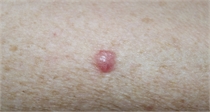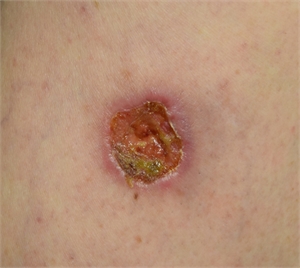Skin Cancer and Mohs Reconstruction
Skin Cancer
Skin cancer is the most common types of cancer in the United States, with over 3 million patients diagnosed each year! These types of skin cancers are especially common in sun-exposed areas, such as Los Angeles. Many people in Burbank, Encino, and other areas across Los Angeles will develop common types of skin cancer each year such as basal cell carcinoma and squamous cell carcinoma, with melanoma being another common type.
Basal Cell Skin Cancer

Basal cell skin cancers are the most common form of skin cancer. Basal cell cancers typically are believed to originate from cells in the basal layer of the epidermis, most commonly in sun exposed areas. Their appearance is varied, but in general may appear as waxy papules (bumps) often with a central depression. There may be telangectasias, or streaking blood vessels, around the central bump. Often, basal cell tumors may bleed easily when irritated. Fortunately, most basal cell skin cancers are slow growing and rarely spread to other areas of the body, although they usually invade the local areas of the surrounding skin. Depending on the size of the basal cell skin cancer, a variety of treatments may be effective. Surgical excision is a common treatment, and for cosmetically sensitive areas, Mohs micrographic surgery is a good treatment option. During this procedure, a dermatologist will remove the skin cancer and will look at the margins of the basal cell to make sure that the entire cancer has been removed. If necessary, the dermatologist may take additional margins and in this way, the entire Basal cell skin cancer can be excised while removing the minimal amount of tissue. Alternatively, Dr. Hirsch can remove the skin cancer and perform the reconstruction at the same time.
Squamous Cell Skin Cancer

Squamous cell carcinoma is the second most common form of skin cancer, after basal cell carcinoma. Squamous cell carcinomas also arise within the epidermis, but from a different cell than basal cell carcinoma. Squamous cell skin cancers often appear as ulcers that may be crusted or bleeding, while pre-cancerous forms of squamous cell skin cancers include actinic keratosis, which can appear scaly and red. Unlike basal cell skin cancers, squamous cell cancers may occasionally spread to distant areas of the body so for larger squamous call cancers, imaging or other diagnostic tests may be necessary. Depending on the size of the squamous cell skin cancer, a variety of treatments are available but surgery is usually the treatment of choice for larger squamous cell skin cancers. Mohs surgery is also an option for cosmetically sensitive areas, as well as surgical excision by Dr. Hirsch.
Skin Cancer and Mohs Surgery Reconstruction
The treatment of skin cancer on cosmetically sensitive areas, such as the face, presents a difficult problem. Over time, techniques such as MOHS micrographic surgery have been developed that provide effective treatment of the cancer while also minimizing distortion of the appearance. However, once the cancer has been removed, there is often a wound that must be closed with utmost concern to preservation of the aesthetic appearance.
In order to reconstruct the wounds caused by MOHS surgery and skin cancer treatment, Dr. Hirsch will use a variety of techniques including skin grafts, local flaps, and even microvascular surgery in some instances. On the face, there are multiple local flaps that Dr. Hirsch can use to maximize the aesthetic appearance in cosmetically sensitive areas such as the nose, lips, and eyelids. Dr. Hirsch individualizes the treatment to each wound, location, and situation, and he will work with your dermatologist, surgical oncologist, or skin cancer treating physician to provide you with the best aesthetic and oncologic result possible. Dr. Hirsch works with dermatologists in Los Angeles, Sherman Oaks, Burbank, Encino, and several other areas throughout Los Angeles and will coordinate care so that your treatment process is as smooth as possible.
In general, recovery after MOHS or skin cancer reconstruction depends on the surgery that Dr. Hirsch performs. Simple closures or skin grafts cause little pain or discomfort. Larger flaps and more extensive procedures have longer recovery times. At the time of your surgery, Dr. Hirsch will discuss your expected recovery time with you.
For existing patients, please download post operative instructions.
Frequently asked questions about skin cancer/MOHS reconstruction:
HOW LONG SHOULD I WAIT AFTER MOHS SURGERY TO HAVE MY RECONSTRUCTION?
Reconstruction after MOHS surgery can be performed immediately after the MOHS surgery is complete- there is no need to wait. Alternatively, it is possible to wait up to 5-7 days if necessary to perform reconstruction as well.
MY MOHS SURGERY WAS PERFORMED IN A FACILITY THAT DR. HIRSCH DOES NOT WORK IN. CAN HE STILL PERFORM MY RECONSTRUCTION?
If your MOHS surgery or skin cancer excision was performed somewhere that Dr. Hirsch does not work, he can still perform your reconstruction. Have your MOHS surgeon or surgical oncologist place a moist dressing on the site of your skin cancer excision, and then Dr. Hirsch can perform the reconstruction in the next few days. It is best if you have met with Dr. Hirsch before your MOHS surgery or skin cancer excision so that he can coordinate with you MOHS surgeon or surgical oncologist to make sure that you get the most timely care possible.
WHERE WILL DR. HIRSCH PERFORM MY MOHS/SKIN CANCER RECONSTRUCTION?
Depending on the extent of your MOHS/skin cancer surgery, there are several places that Dr. Hirsch can perform your surgery. For smaller wounds that can be closed primarily or with a small local flap or skin graft, Dr. Hirsch can perform the surgery in his office under local anesthesia. For wounds that are larger and require more extensive reconstruction, Dr. Hirsch can perform the procedures in a hospital or surgery center.
Additional resources about skin cancer
Feel free to browse the following links to learn more about skin cancer, Mohs surgery, and skin cancer reconstruction:
https://www.skincancer.org/skin-cancer-information/melanoma
https://www.cancer.org/cancer/skin-cancer.html
